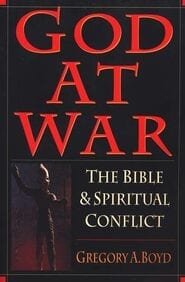“God at War” immediately stirs controversy within academic Christian theology and informs those in the Body of Christ, the Church, about spiritual warfare. Printed by InterVarsity Press, “God at War: The Bible & Spiritual Conflict,” by Princeton PhD. Gregory A. Boyd, expands the amount of academic theological writing on the subject of spiritual warfare. Compare E. Janet Warren’s theology as written in the article, “Chaos and Chaos-Complexity Theory: Understanding Evil Forces with Insights from Contemporary Science and Linguistics,”
Current or past beliefs probed by Boyd’s arguments may offend some. For those people seeking help to understand “why bad things happened” to them, to their families, to their social group, and to mankind in general, “God at War” adds the “warfare worldview” to the existing Biblical research.
In the syllabus of the DVD class, One Day With The Creator, by The Living Truth Fellowship, Boyd’s book is listed as a reference in Segment 11.
Arguments for the “God at War” worldview, as Boyd paints it, include a Cosmic War of epic proportions, including named spiritual beings versus God Almighty. According to Boyd, the Cosmos consists of more than what Western religions believe. “This notion that there exists a council, or a society, of divine beings, between humans and God who, like us, have free wills and can therefore influence the flow of history for better or for worse, is obviously jarring to a number of Western worldview assumptions,” writes Boyd, on page 140. Boyd uses ancient texts such as the “Epic of Gilgamesh” in addition to descriptions from the book of Job, where “leviathan” and “behemoth” are named, (p. 52).
Boyd quotes Gustaf Wingren from “Living Word:” “The war of the Lord is finished, and the great blow is struck. Never again can Satan tempt Christ, as in the desert. Jesus is now Lord, Conqueror. But a war is not finished, a conflict does not cease, with the striking of the decisive blow. The enemy remains with the scattered remnants of his army, and in pockets here and there a strong resistance may continue.” Still, Satan’s army initiates desultory fights with people (Boyd, pp. 54 and 55). The outcome of those spiritual skirmishes seems to look like “bad things that happen to good people.”
Other writers and ethicists wrote about Why Bad Things Happen to Good People, in the book of the same name, by Rabbi Harold S. Kushner, and in Don’t Blame God, by John A. Lynn, John W. Schoenheit, and Mark Graeser, (See Amazon.com for both books). Jesus’ work of raising people from the dead is termed by Boyd as “acts of war” (p. 213). Boyd adds, “All such resuscitations must be viewed as acts of war against a cosmic foe who had been mastering mortality for far too long.”
There is a battle that each human battles, each in her own arena, in her mind. Boyd writes on page 279, quoting 2 Corinthians, “Indeed, we live as human beings, but we do not wage war according to human standards; for the weapons of our warfare are not merely human, but they have divine power to destroy strongholds. We destroy arguments and every proud obstacle raised up against the knowledge of God, and we take every thought captive to obey Christ.”
The good news is that Christians have the victory in Christ Jesus, as Boyd discusses in his Chapter 9, “Christus Victor: The Warfare Significance of Christ’s Death and Resurrection” (p. 260ff).
In summary, within the scope of the One Day With The Creator class, God at War informs readers of a biblical “warfare worldview.” From Boyd’s text, footnotes, a selected bibliography, and a Scripture reference one can learn of God’s glorious goals from a Theocentric rather than Anthropocentric theological point of view (pp. 267 and 268).
[This review of God at War, by Gregory A. Boyd, 1997, InterVarsity Press, U.S.A., is by David Ernest Moore Jr., M.Ed.]
